This section considers the extent to which Hispanics age 65 or older receive Social Security benefits and at what levels they receive them. Relatively fewer Hispanics than whites or blacks receive income from Social Security, and their levels of benefits are also lower on average. However, Social Security is a more important source of income for retired Hispanics than for other retirees, and Social Security keeps more of them out of poverty than it does members of other racial or ethnic groups.
Older Hispanics are less likely than older whites and blacks to receive Social Security (Figure 2). About 75 percent of older Hispanics receive Social Security, compared with 91 percent of whites and 85 percent of blacks. This lower recipient percentage among older Hispanics is explained by several factors. First, a small fraction of older foreign-born Hispanics do not have legal immigration status and thus are not eligible to receive benefits; a somewhat larger share spent some part of their lives in the United States as unauthorized workers and were not able to have a Social Security number in their own name. Second, in order to qualify for Social Security benefits an individual must be at least age 62 and have earned a threshold amount of income during employment covered by Social Security for the equivalent of at least 10 years. Because of immigration and work histories, a greater share of Latinos than whites fail to meet one or both of these qualifications.
 Among older individuals receiving Social Security, the average amount received by Hispanics trails the amount paid to white and black recipients (Figure 3). The average annual Social Security benefit received by older Hispanics was about $8,497 in 2003.3 In comparison, whites received an average benefit of $10,621 and blacks drew $8,828 in benefits. The lower benefits paid to Hispanic recipients are a reflection of their earnings history. Social Security benefits are based on the highest 35 years of earnings on which the recipient paid Social Security taxes. Hispanics are more likely to have been lowwage workers and more likely to have worked in jobs not covered by Social Security; accordingly, their Social Security benefits tend to be lower on average.
Among older individuals receiving Social Security, the average amount received by Hispanics trails the amount paid to white and black recipients (Figure 3). The average annual Social Security benefit received by older Hispanics was about $8,497 in 2003.3 In comparison, whites received an average benefit of $10,621 and blacks drew $8,828 in benefits. The lower benefits paid to Hispanic recipients are a reflection of their earnings history. Social Security benefits are based on the highest 35 years of earnings on which the recipient paid Social Security taxes. Hispanics are more likely to have been lowwage workers and more likely to have worked in jobs not covered by Social Security; accordingly, their Social Security benefits tend to be lower on average.
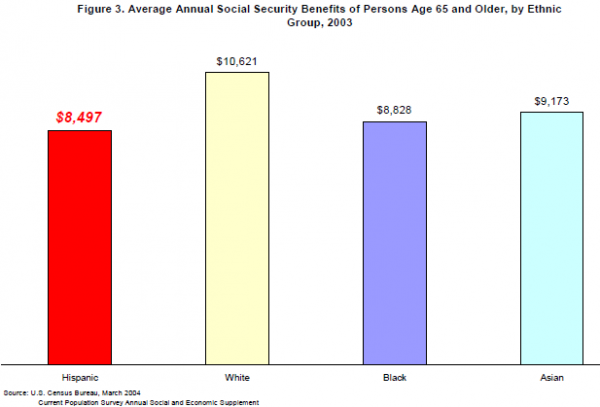 Older Hispanics tend to receive less Social Security, but they rely on it to a greater extent than older whites. Social Security comprises more than half of total income for 76 percent of older Hispanic beneficiaries; this is true for only 63 percent of older white beneficiaries. Almost half of older Latino beneficiaries rely on Social Security for 90 percent or more of their income, and for 38 percent of older Latino beneficiaries Social Security is their sole source of income (Figure 4).
Older Hispanics tend to receive less Social Security, but they rely on it to a greater extent than older whites. Social Security comprises more than half of total income for 76 percent of older Hispanic beneficiaries; this is true for only 63 percent of older white beneficiaries. Almost half of older Latino beneficiaries rely on Social Security for 90 percent or more of their income, and for 38 percent of older Latino beneficiaries Social Security is their sole source of income (Figure 4).
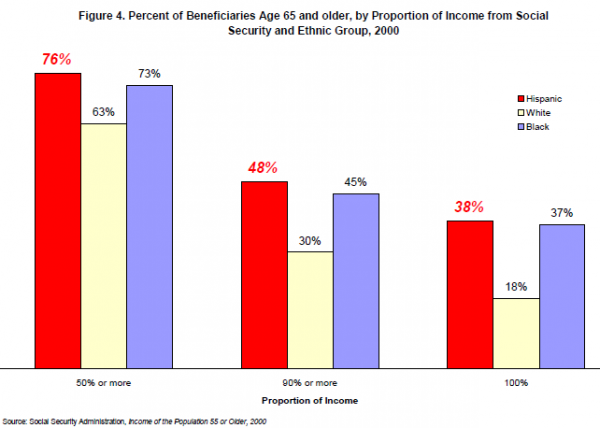 Since Hispanics past retirement age are less likely to receive Social Security and, on average, receive less of it, it is not surprising that they are more likely to live in poverty. Almost 20 percent of older Hispanics are living in poverty, compared with 8 percent of whites (Table 2). But Social Security makes a huge difference for older Hispanics in keeping them out of poverty. In the absence of Social Security, half of older Hispanics would be in poverty (Figure 5).
Since Hispanics past retirement age are less likely to receive Social Security and, on average, receive less of it, it is not surprising that they are more likely to live in poverty. Almost 20 percent of older Hispanics are living in poverty, compared with 8 percent of whites (Table 2). But Social Security makes a huge difference for older Hispanics in keeping them out of poverty. In the absence of Social Security, half of older Hispanics would be in poverty (Figure 5).
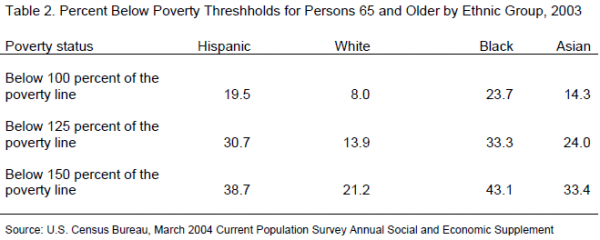
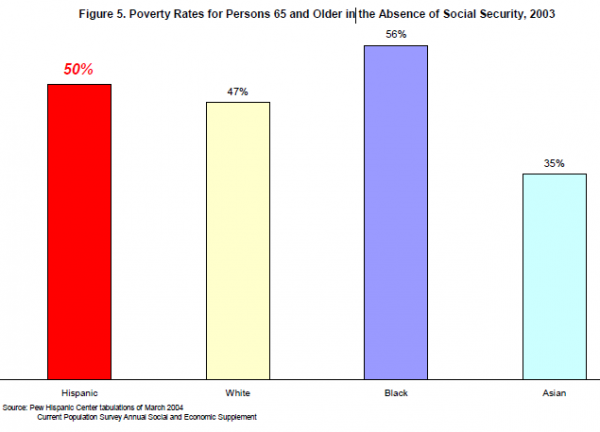 Social Security looms larger for Hispanics because they have relatively fewer alternative sources of income in retirement. The greatest difference lies in the receipt of income from assets. Over 60 percent of older whites have income-producing assets, in comparison with only 25 percent of Latinos (Figure 6)4. And Hispanics are the least likely of any racial or ethnic group to receive income from a pension;5 more than 33 percent of older whites received income from a pension in 2003, in comparison with 15 percent of older Hispanics. About the only area of parity between older Hispanics and older whites is their involvement in the labor market. About one in six of all persons 65 or older received earnings in 2003.
Social Security looms larger for Hispanics because they have relatively fewer alternative sources of income in retirement. The greatest difference lies in the receipt of income from assets. Over 60 percent of older whites have income-producing assets, in comparison with only 25 percent of Latinos (Figure 6)4. And Hispanics are the least likely of any racial or ethnic group to receive income from a pension;5 more than 33 percent of older whites received income from a pension in 2003, in comparison with 15 percent of older Hispanics. About the only area of parity between older Hispanics and older whites is their involvement in the labor market. About one in six of all persons 65 or older received earnings in 2003.
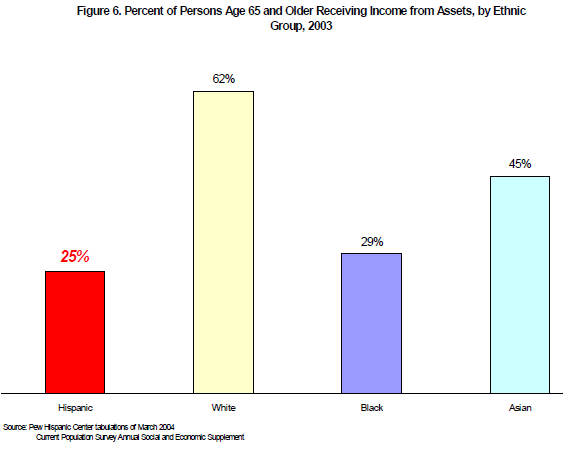 In sum, Latinos age 65 or older are in worse economic condition than other racial and ethnic groups. They lack income from private pension plans or personal wealth, and more of them live in poverty. As a result, elderly Hispanics are much more dependent on the Social Security system than other groups of retirees.
In sum, Latinos age 65 or older are in worse economic condition than other racial and ethnic groups. They lack income from private pension plans or personal wealth, and more of them live in poverty. As a result, elderly Hispanics are much more dependent on the Social Security system than other groups of retirees.


